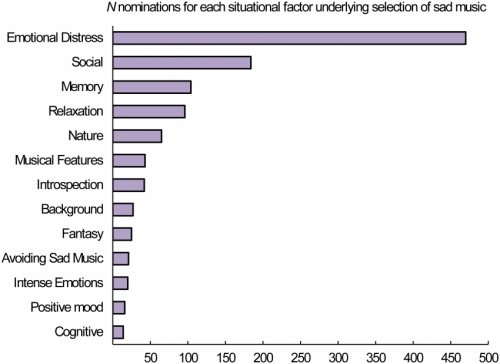November 9, 2014 weblog
Sad music hits positive notes of emotional rewards

(Medical Xpress)—Sadness is discouraged; it's a mood to flee. We tell children not to look so sad. We tell adults to wipe that sad look off their face and smile. We worry that prolonged sadness needs medical attention. So why do people deliberately spend their money to hear sad songs—and flock to big-ticket concerts, applauding the loudest for the saddest tunes imaginable? If sadness is such a negative, why do we send our money and time wallowing in sad tunes?
"The Paradox of Music-Evoked Sadness: An Online Survey" says just what the title of this paper suggests: Sad tunes trigger emotions and experiences beyond sadness. The study, published in PLOS ONE, demonstrates that for many individuals, listening to sad music can instead lead to beneficial emotional effects. "The aim of this study was to provide a better understanding of why people engage with sad music," they said. The study, by Liila Taruffi and Stephan Koelsch, looked at responses from 772 participants to an online survey; they were a multi-ethnic sample covering diverse age groups responding to questions exploring their experiences listing to sad music. The authors looked at principles that underlie the evocation of sadness by music and the rewarding aspects of music-evoked sadness, among other factors.
In total, the survey featured 76 items. Participants were instructed to complete the survey individually and in a quiet environment without listening to any music.
Discussing the results, the authors said that, surprisingly, "nostalgia rather than sadness is the most frequent emotion evoked by sad music. Correspondingly, memory was rated as the most important principle through which sadness is evoked. Finally, the trait empathy contributes to the evocation of sadness via contagion, appraisal, and by engaging social functions. The present findings indicate that emotional responses to sad music are multifaceted, are modulated by empathy, and are linked with a multidimensional experience of pleasure revealing that listening to sad music can lead to beneficial emotional effects such as regulation of negative emotion and mood as well as consolation. Such beneficial emotional effects constitute the prime motivations for engaging with sad music in everyday life."
Another interesting observation by the authors of this study was that "the beneficial emotional effects of sad music may be enhanced in emotionally unstable individuals, because our results suggest that they use sad music to regulate emotion." They had similarly stated in the abstract that "appreciation of sad music follows a mood-congruent fashion and is greater among individuals with high empathy and low emotional stability."
They said "results strongly highlight that, for most of the people, the engagement with sad music in everyday life is correlated with its potential to regulate negative moods and emotions as well as to provide consolation."
The two authors are from the Freie Universität in Berlin. Koelsch is a professor of music psychology, and one of his areas of expertise is music therapy. Taruffi is a research assistant. They said their study's potential implications include developing music interventions "designed to improve health and well-being in healthy subjects as well as in the treatment of psychiatric disorders."
More information: Taruffi L, Koelsch S (2014) The Paradox of Music-Evoked Sadness: An Online Survey. PLoS ONE 9(10): e110490. DOI: 10.1371/journal.pone.0110490
Abstract
This study explores listeners' experience of music-evoked sadness. Sadness is typically assumed to be undesirable and is therefore usually avoided in everyday life. Yet the question remains: Why do people seek and appreciate sadness in music? We present findings from an online survey with both Western and Eastern participants (N = 772). The survey investigates the rewarding aspects of music-evoked sadness, as well as the relative contribution of listener characteristics and situational factors to the appreciation of sad music. The survey also examines the different principles through which sadness is evoked by music, and their interaction with personality traits. Results show 4 different rewards of music-evoked sadness: reward of imagination, emotion regulation, empathy, and no "real-life" implications. Moreover, appreciation of sad music follows a mood-congruent fashion and is greater among individuals with high empathy and low emotional stability. Surprisingly, nostalgia rather than sadness is the most frequent emotion evoked by sad music. Correspondingly, memory was rated as the most important principle through which sadness is evoked. Finally, the trait empathy contributes to the evocation of sadness via contagion, appraisal, and by engaging social functions. The present findings indicate that emotional responses to sad music are multifaceted, are modulated by empathy, and are linked with a multidimensional experience of pleasure. These results were corroborated by a follow-up survey on happy music, which indicated differences between the emotional experiences resulting from listening to sad versus happy music. This is the first comprehensive survey of music-evoked sadness, revealing that listening to sad music can lead to beneficial emotional effects such as regulation of negative emotion and mood as well as consolation. Such beneficial emotional effects constitute the prime motivations for engaging with sad music in everyday life.
© 2014 Medical Xpress















